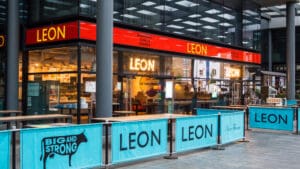Asda has sold Leon back to its co-founder John Vincent, ending four turbulent years of ownership under the Issa brothers that saw the once health-focused fast-food chain accused of losing its identity.
The deal, which includes 46 company-owned restaurants and 25 franchise sites, comes amid growing criticism that Leon had drifted away from its founding principles of “natural fast food” in favour of higher-calorie, processed items.
Vincent, who launched the chain in 2004 with food campaigner Henry Dimbleby, said he plans to take “a good look under the bonnet” before making major decisions about the company’s direction.
“If you are a Leon guest, I want you to know we are on the case,” Vincent said. “We will now get on with dedicating ourselves to your enjoyment and to your health.”
While financial terms were not disclosed, industry sources suggested Vincent bought the business at a steep discount to the £100 million it fetched when the Issa brothers’ EG Group acquired it in 2021.
The sale completes a full circle for Leon, which the Issas first purchased via EG Group, their petrol forecourt empire, before transferring it to Asda in 2023 to help reduce EG’s multibillion-pound debt load.
The brothers’ control of Leon — and its subsequent integration into Asda’s operations — drew mounting criticism from health campaigners and industry insiders, who said the brand had abandoned its “naturally fast food” ethos.
In early October, co-founder Henry Dimbleby accused Asda of “destroying” the brand, pointing to menu changes such as burgers, nuggets, fries, cookies and cakes that replaced Leon’s former focus on nutritious options.
“I know how easy it is to be sucked down into going for what’s tasty — the sugar, the salt, the cheap,” Dimbleby told The Telegraph. “But in the long term, that’s going to destroy the brand.”
Under Asda, Leon also expanded into supermarket retail with frozen and microwaveable meals, and rolled out hundreds of branded coffee stations across the UK — a strategy designed to scale revenues but one that critics said diluted its premium, health-first image.
Leon’s most recent accounts show revenues fell from £64.9 million in 2023 to £62.5 million in 2024, reflecting weak consumer confidence and a loss of brand loyalty among its core customers.
The slowdown, combined with reputational strain, prompted speculation that Asda was preparing to divest the business. For Vincent, the buyback offers a chance to reclaim Leon’s original purpose — “food that tastes good and does you good.”
“We will take our time, listen to our guests and our teams, and make decisions that stay true to Leon’s mission,” Vincent said after the deal.
An Asda spokesperson thanked Leon employees for their “contribution and hard work” over the past two years, saying: “We wish them all the best as they move forward under new ownership.”
For Asda, the sale simplifies its portfolio as it focuses on debt reduction and supermarket integration following the Issa brothers’ leveraged takeover.
For Leon, it represents a second chance. Once hailed as Britain’s answer to healthy fast food, the brand now faces the challenge of rebuilding consumer trust and reaffirming its place on the high street.
With Vincent back at the helm, industry observers say Leon’s comeback story may depend on whether it can balance its original healthy ethos with commercial reality — and prove that fast food can still be good food.

